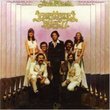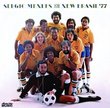| All Artists: Sergio Mendes Title: Sergio Mendes/Magic Lady Members Wishing: 3 Total Copies: 0 Label: Collectables Original Release Date: 4/12/2005 Release Date: 4/12/2005 Genres: Dance & Electronic, International Music, Jazz, Pop, R&B, Rock Styles: Disco, South & Central America, Brazil, Smooth Jazz, Vocal Jazz, Soft Rock, Vocal Pop, By Decade, 1970s, Soul, Quiet Storm Number of Discs: 1 SwapaCD Credits: 1 UPC: 090431767023 |
Search - Sergio Mendes :: Sergio Mendes/Magic Lady
 | Sergio Mendes Sergio Mendes/Magic Lady Genres: Dance & Electronic, International Music, Jazz, Pop, R&B, Rock
|
CD DetailsSimilar CDs |
CD ReviewsTwo atypical albums from Mendes JMK | Pacific Northwest | 12/29/2005 (3 out of 5 stars) "These two albums, originally released on Elektra in 1975 and 1979, are not for those looking for the classic Brasil '66 sound that introduced most people to the genius of Sergio Mendes. By the time Mendes joined Elektra in 1975 and released his self-titled album (the first 10 tracks on this CD), he had long ago kissed the classic Brasil '66 sound goodbye. But this first Elektra album was a big surprise to a lot of people--it was really Sergio's first all out foray into soul territory, something he would continue to develop for his entire 70s Elektra output, probably not solely because of the use of his first African American vocalist, Sondra Catton (the incredible Carol Rogers would soon join him and become his longest-serving vocalist). Sergio obviously saw the handwriting on the wall--the Bossa Nova years were over and he needed to find new directions to stay alive in the ever-changing pop music marketplace. "Sergio Mendes" was actually Sergio's biggest hit, album wise, in years, though it failed to produce a hit single. However, there are some standout tunes, notably "Davy" and "The Trouble With Hello is Goodbye." "Magic Lady" is, to most long-time Mendes fans, the nadir of his career, an obvious attempt to blend the patented Mendes rhythm section with disco music. While there are, again, some great tunes--"I'll Tell You," "Lonely Woman" and "A Dream Come True"--there are also songs that many find cringe-worthy. The sad part is, the album is Sergio's only collaboration with Tower of Power, and the horn charts are amazing. The material, sadly, is not up to the players and singers (including the aforementioned Carol Rogers). The CD mastering of "Magic Lady" unfortunately does not repair the hideous original LP mastering, which makes the entire album sound like it is emanating from a small cardboard box. For those who are interested in seeing how Sergio adapted his trademark sound to a new audience, these two albums will prove instructive and enjoyable. If you're looking for the smooth, sophisticated sound of Brasil '66, you'd better keep looking." Mendes "covers" and dons some platform shoes! Reginald D. Garrard | Camilla, GA USA | 08/21/2005 (4 out of 5 stars) "This re-issue is a compilation of two distinct albums of Mendes's releases from the 1970's. The first ten songs come from the musician/arranger's self-titled album, an homage to songs made famous by others. Three songs written by Stevie Wonder ("All in Love is Fair," "I Believe When I Fall in Love It Will Be Forever," and "Lookin' for Another Pure Love") are featured, along with George Harrison's "Here Comes the Sun". The compositions of Thom Bell and Linda Creed (of Philadelphia sound fame) are reflected in the cover of "Let Them Work it Out".
The best cuts are the remake of Donnie Hathaway's classic "Someday We'll All Be Free" and "The Trouble With Hello is Goodbye," a song reminiscent of Mendes's earlier "When Summer Turns to Snow" from the 60's. Five stars are given to this release. 1979's "Magic Lady" was Mendes's attempt to get on the "disco bandwagon". "I'll Tell You," the first track on the initial release (#11 here), was a minor dance hit and it is symbolic of the sound of the era: throbbing bass lines, kinky percussion accompaniments, and monotonous "chants" from the background singers. Though the album features a powerhouse of talented musicians (Tom Scott, Michael Sembello, Oscar Neves, and the Tower of Power Horn Section), it never ascends beyond the average. And for that it only gets three stars. The best cut is "A Dream Come True (Can't Hardly Wait)"." |

 Track Listings (18) - Disc #1
Track Listings (18) - Disc #1


